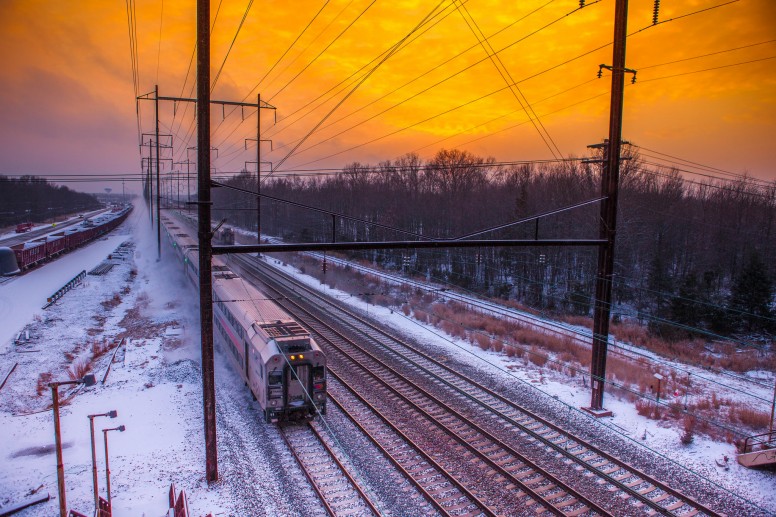Transportation in New Jersey finally got some attention but very little love in 2015. Governor Chris Christie and the New Jersey Legislature failed to acknowledge dwindling transportation funding in the state budget, top transportation officials left their posts, NJ Transit riders faced their fifth fare hike since 2000 and drivers have enjoyed the lowest gas prices in years (along with a gas tax that remains unchanged since 1988).
It wasn’t all bad news though.
The Good
Gateway project gaining steam — Nearly five years after Governor Christie pulled the plug on ARC, plans to replace the crumbling, at-capacity 105-year-old trans-Hudson rail tunnels gained traction this year. In November, Governors Christie and Cuomo struck a deal to fund half of Gateway while the other half would be paid with federal funds. The following month, President Obama signed into law the first long-term transportation authorization in over a decade–which allows Amtrak to use its net profits from the Northeast Corridor to fund the projected $20 billion project. Commuters, however, may not see real relief until all four tunnels are back in service in the late 2020s.
Hudson County steadily becoming more bike-friendly — After over a year and a half of waiting, Hudson County now has not one, but two bike share programs. Jersey City’s 350-bike system is interoperable with New York’s Citi Bike, allowing members to take advantage of the bikes on either side of the Hudson. Hoboken’s network–though not Citi Bike-compatible–presently offers 120 bikes at 17 stations and is designed so that no resident is more than a three- to five-minute walk from a station. And both cities have made strides in improving bicycle infrastructure: Jersey City announced plans to expand its existing 22-mile bike lane network, while Hoboken was awarded a $530,000 state grant to install 15 miles of bike lanes.
The Bad
Transportation officials jumping ship while funding crisis looms — This fall, NJ Transit Executive Director Ronnie Hakim, Director of Trans-Hudson Project Planning Richard Andreski and NJDOT Transportation Commissioner Jamie Fox all resigned from their respective positions. New Jersey is heading into 2016 without strong voices to fix New Jersey’s pile of transportation troubles.
Port Authority transparency and capital priorities still foggy — The Port Authority Bus Terminal first exceeded capacity in 1966, and yet, in 2015, the PA Board of Directors continue to lack a clear vision of what replacing the 65-year-old terminal might entail. The agency also released a 100-page, $7.9 billion capital and operating budget plan just 11 days before the scheduled Board vote—not enough time for members to thoroughly review the actual document and public comments.
Garden State laws and roads continue to shortchange vulnerable road users — New Jersey still doesn’t have a Safe Passing Law, and the state’s bike-friendly ranking fell yet again in 2015. This comes at a time when one-third of road fatalities in New Jersey are bicyclists and pedestrians, and funding for bike and pedestrian projects in the NJDOT Capital Program remains flat at 2.5 percent.
The Ugly
Fare hikes, service cuts and a growing deficit for NJ Transit — Governor Christie and legislative leaders’ failure to provide new revenue for transportation in the state budget resulted in a 9 percent fare hike and service cuts for NJ Transit riders. The agency used those tactics to close a $60 million operating budget gap for 2016. But between an expiring cash infusion, increasing operating costs and a pending labor dispute, that gap is likely to swell to $400 million in 2017.
Transportation funding “not a crisis.” — Back in February, Governor Christie dismissed transportation funding as “not a crisis,” despite the impending expiration of the Transportation Trust Fund in July 2016. Since then, Christie has been more open to considering a gas tax hike, but only if coupled with cuts elsewhere (this stipulation, however, was not applied to NJ Transit fare hikes). The TTF, though, is already on its last leg: the remaining bonds from the current five-year TTF finance plan were sold last month. With three weeks left in the legislative session, time is running out to provide a viable solution to replenish the Transportation Trust Fund before it expires at the end of FY2016.
Governor Christie as “Gateway champion” — He killed the ARC tunnel and paid no attention to the plight of NJ Transit riders whose fares keep rising. And yet, the governor recently has been quite vocal about his support for the Gateway project. Let’s be clear, Governor Christie is no friend of transit riders.


[…] Tri-State Looks Back at the Year in NJ Transportation — It Wasn’t All Bad […]
[…] the document can’t be found anywhere on the web. And the Port Authority gave the public only 11 days for to review its 100-page, $7.9 billion capital and operating budget plan before the Board of Directors was to review public comment and vote on the […]
New Jersey is burdened with one of the worst governors in the state’s history. Whatever Chris Christie, or his cronies, got their hands on turned to complete crap. From the failed casino launching in Atlantic City to the turning over of the state’s lottery to an outside vendor who made a substantial contribution the Republican Governor’s Association (when chaired by Christie), Christie and his cronies have reaped personal rewards from this state at the cost of taxpayers. With some of the lowest gas prices in the US, this state can readily afford to raise the tax on gasoline to help replenish the chronically underfunded Transportation Trust Fund. But since our dear governor would rather talk tough about non-threatening Syrian refugees to appeal to his white xenophobic base and he embraces a foolhardy pledge to not raise any taxes, the transportation needs of this state will remain in a perpetual crisis state.